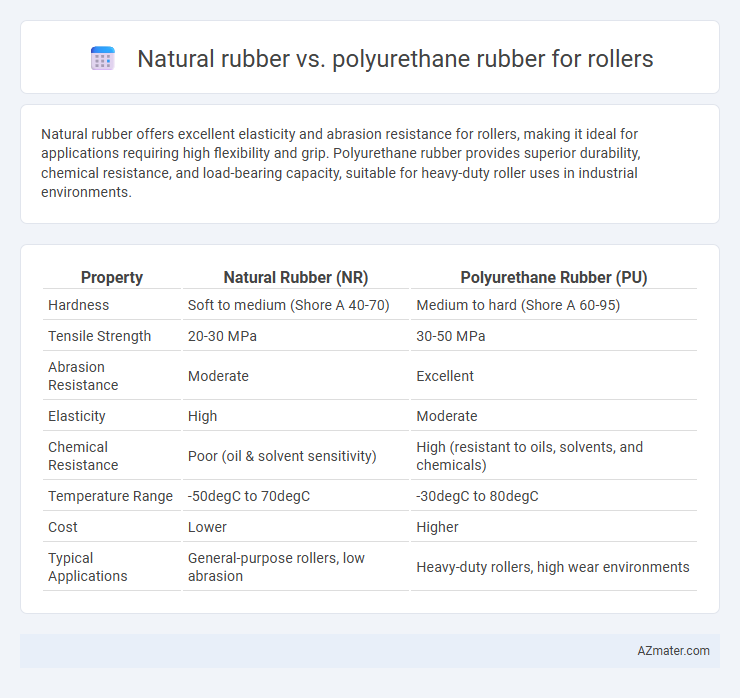Natural rubber offers excellent elasticity and abrasion resistance for rollers, making it ideal for applications requiring high flexibility and grip. Polyurethane rubber provides superior durability, chemical resistance, and load-bearing capacity, suitable for heavy-duty roller uses in industrial environments.
Table of Comparison
| Property | Natural Rubber (NR) | Polyurethane Rubber (PU) |
|---|---|---|
| Hardness | Soft to medium (Shore A 40-70) | Medium to hard (Shore A 60-95) |
| Tensile Strength | 20-30 MPa | 30-50 MPa |
| Abrasion Resistance | Moderate | Excellent |
| Elasticity | High | Moderate |
| Chemical Resistance | Poor (oil & solvent sensitivity) | High (resistant to oils, solvents, and chemicals) |
| Temperature Range | -50degC to 70degC | -30degC to 80degC |
| Cost | Lower | Higher |
| Typical Applications | General-purpose rollers, low abrasion | Heavy-duty rollers, high wear environments |
Introduction to Roller Materials
Natural rubber offers superior elasticity and excellent abrasion resistance, making it ideal for rollers requiring high flexibility and resilience under dynamic loads. Polyurethane rubber provides enhanced chemical resistance, higher tensile strength, and improved durability in aggressive environments, making it suitable for rollers subjected to heavy wear and exposure to oils or solvents. Choosing between natural rubber and polyurethane for rollers depends on operational demands such as load, environmental exposure, and longevity requirements.
Overview of Natural Rubber
Natural rubber, derived from the latex of Hevea brasiliensis trees, offers excellent elasticity, resilience, and abrasion resistance, making it ideal for rollers subjected to high impact and repetitive motion. Its superior tensile strength and tear resistance provide durability in applications requiring heavy load support and shock absorption. Natural rubber also exhibits good grip and flexibility, ensuring smooth operation and minimal slippage in roller mechanisms across various industrial uses.
Overview of Polyurethane Rubber
Polyurethane rubber offers superior abrasion resistance, high load-bearing capacity, and excellent chemical resistance compared to natural rubber, making it ideal for rollers used in heavy-duty industrial applications. Its enhanced durability extends roller lifespan, reducing maintenance costs and downtime in manufacturing processes. Polyurethane's ability to retain flexibility under a wide temperature range ensures consistent performance in diverse operating environments.
Mechanical Properties Comparison
Natural rubber exhibits excellent elasticity, high tensile strength, and superior tear resistance, making it ideal for rollers requiring flexibility and durability under dynamic loads. Polyurethane rubber offers greater abrasion resistance, higher load-bearing capacity, and enhanced resistance to oils and chemicals, suitable for rollers used in harsher industrial environments. The mechanical property selection between natural rubber and polyurethane depends on application-specific demands for wear resistance versus flexibility and impact absorption.
Durability and Wear Resistance
Natural rubber exhibits excellent abrasion resistance and flexibility, making it suitable for rollers operating under moderate loads and temperatures. Polyurethane rubber outperforms natural rubber in durability, offering superior wear resistance, higher tensile strength, and better resistance to oils, chemicals, and mechanical stress. For applications requiring prolonged service life and exposure to harsh environments, polyurethane rubber rollers provide enhanced durability and reduced maintenance costs compared to natural rubber alternatives.
Performance in Industrial Applications
Natural rubber offers excellent flexibility, high tensile strength, and superior abrasion resistance, making it ideal for rollers in applications requiring shock absorption and grip, such as conveyor systems and printing presses. Polyurethane rubber excels in chemical resistance, load-bearing capacity, and durability under heavy wear, outperforming natural rubber in environments with aggressive chemicals or heavy mechanical stress, like in mining or steel production rollers. Choosing between natural rubber and polyurethane rubber depends on specific industrial needs, with natural rubber favored for elasticity and grip, while polyurethane is preferred for toughness and resistance to harsh conditions.
Chemical and Oil Resistance
Polyurethane rubber exhibits superior chemical and oil resistance compared to natural rubber, making it ideal for rollers exposed to harsh industrial fluids and solvents. Natural rubber tends to degrade when in contact with oils, chemicals, and aggressive substances, leading to faster wear and reduced lifespan. The enhanced durability of polyurethane rubber ensures longer service intervals and reliability in applications involving exposure to petroleum-based products and various chemicals.
Cost and Economic Considerations
Natural rubber rollers generally offer a lower initial cost compared to polyurethane rubber, making them more budget-friendly for applications with tight capital constraints. Polyurethane rubber, despite its higher upfront price, provides longer service life and superior abrasion resistance, reducing replacement frequency and maintenance expenses. Evaluating the total cost of ownership reveals that polyurethane rollers can be more economical over time due to decreased downtime and extended durability.
Environmental Impact and Sustainability
Natural rubber, derived from the latex of rubber trees, offers excellent biodegradability and a renewable source, making it a more sustainable option compared to polyurethane rubber. Polyurethane rubber, synthesized from petrochemicals, poses greater environmental concerns due to its non-biodegradable nature and reliance on fossil fuels, contributing to higher carbon emissions. Considering environmental impact and sustainability, natural rubber rollers present a greener alternative with lower ecological footprints and improved recyclability.
Choosing the Best Rubber for Your Roller
Natural rubber offers excellent elasticity and abrasion resistance, making it ideal for rollers in applications requiring high flexibility and grip. Polyurethane rubber provides superior durability and chemical resistance, suitable for heavy-duty rollers exposed to oils or harsh environments. Selecting the best rubber depends on operational demands such as load, temperature, and exposure to chemicals to ensure optimal roller performance and longevity.

Infographic: Natural rubber vs Polyurethane rubber for Roller
 azmater.com
azmater.com